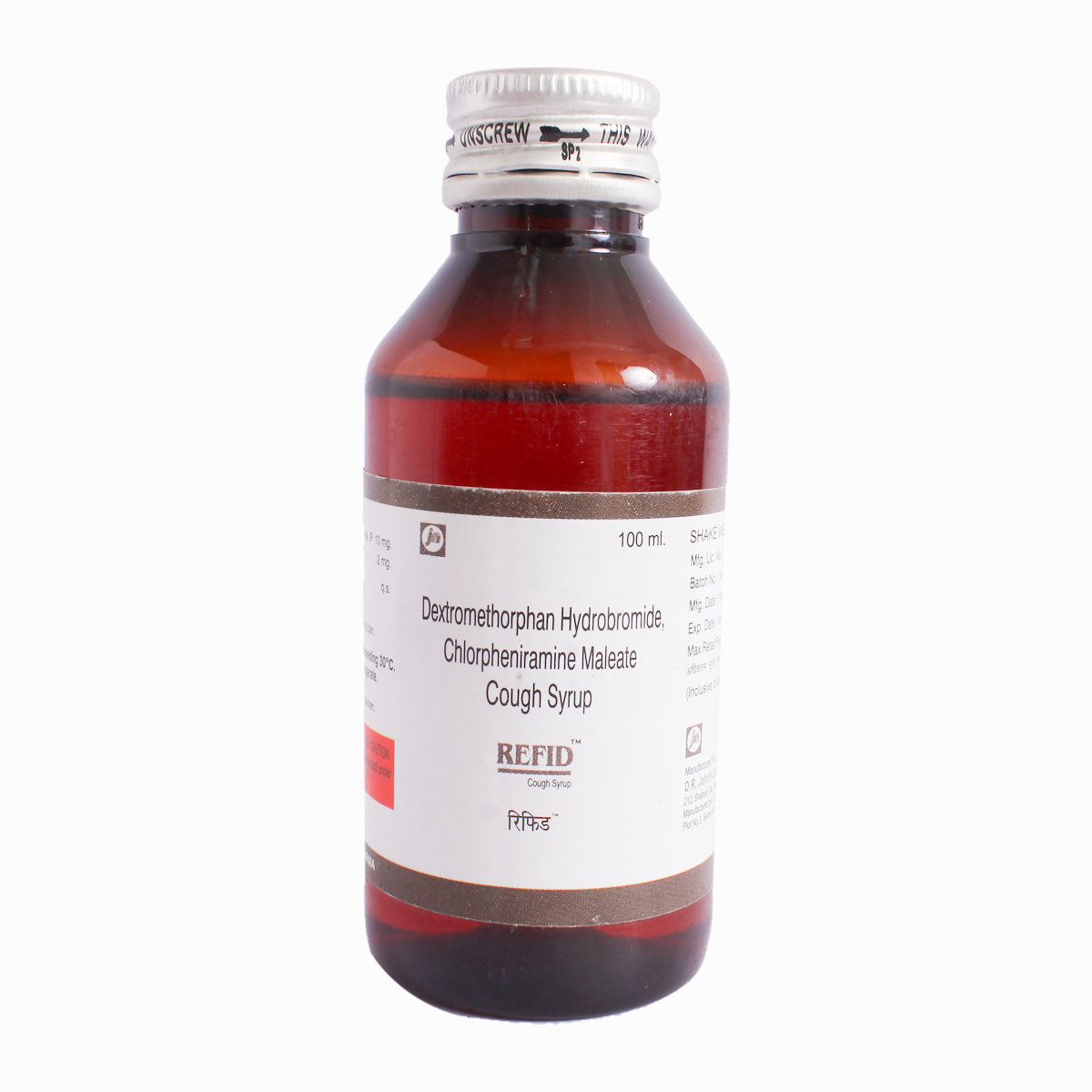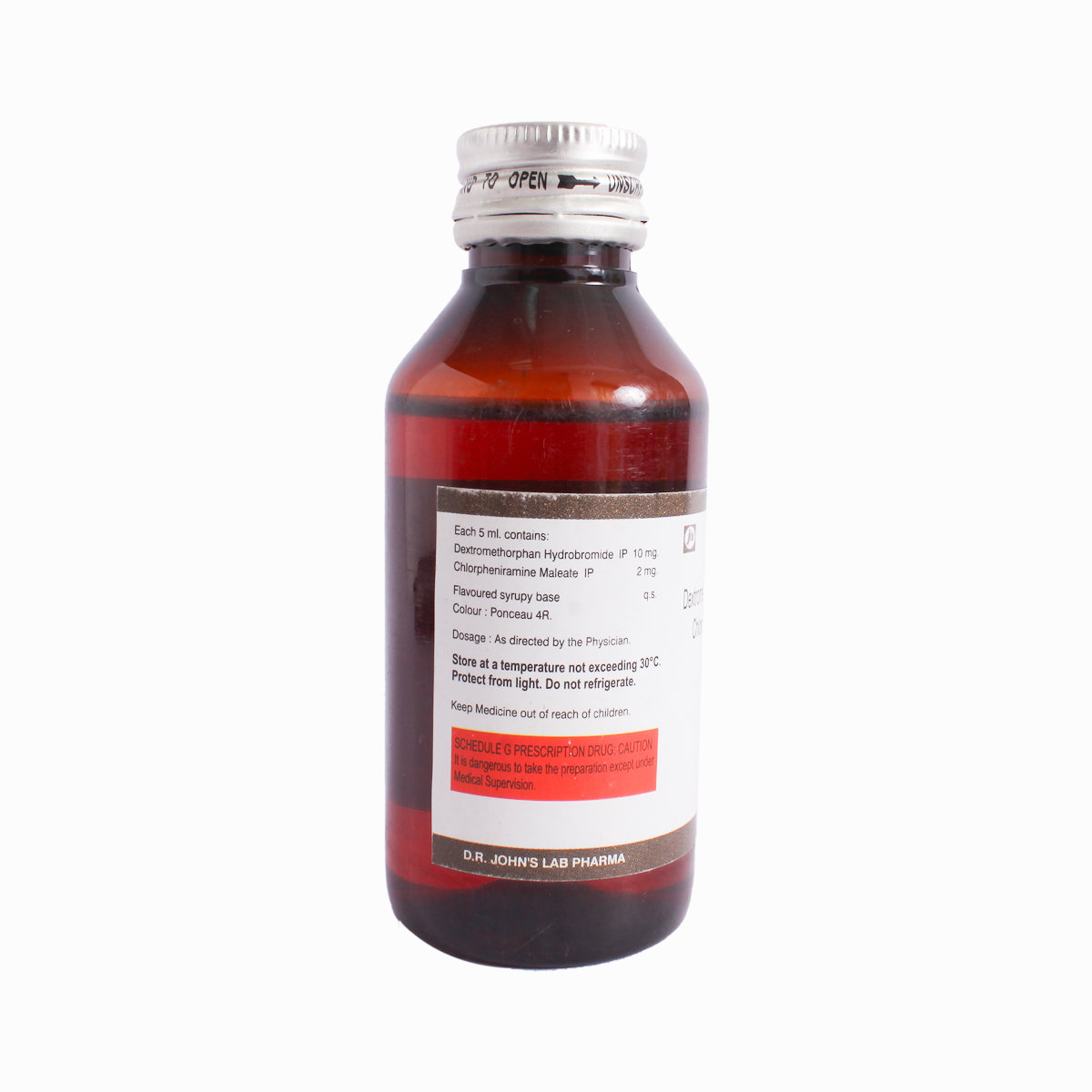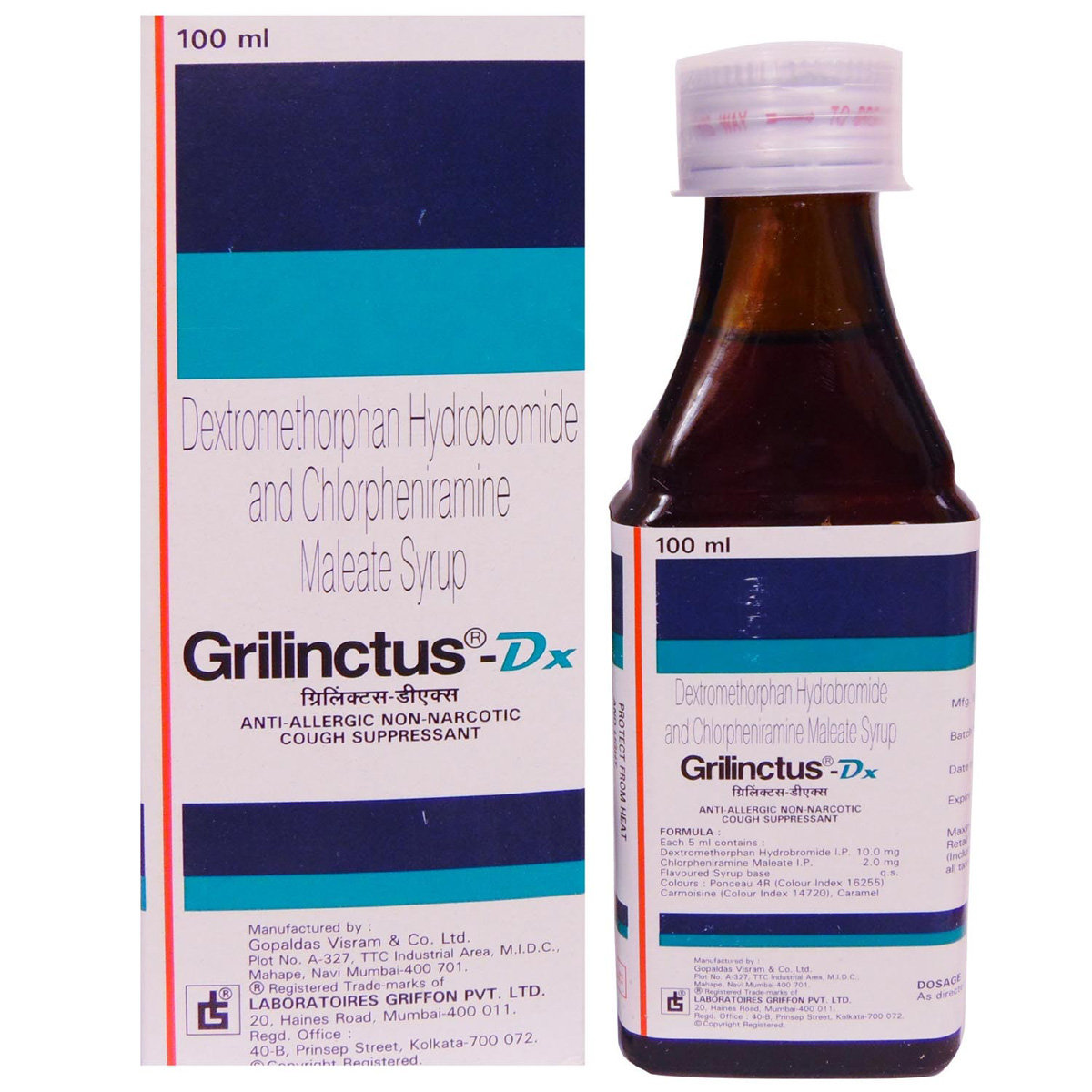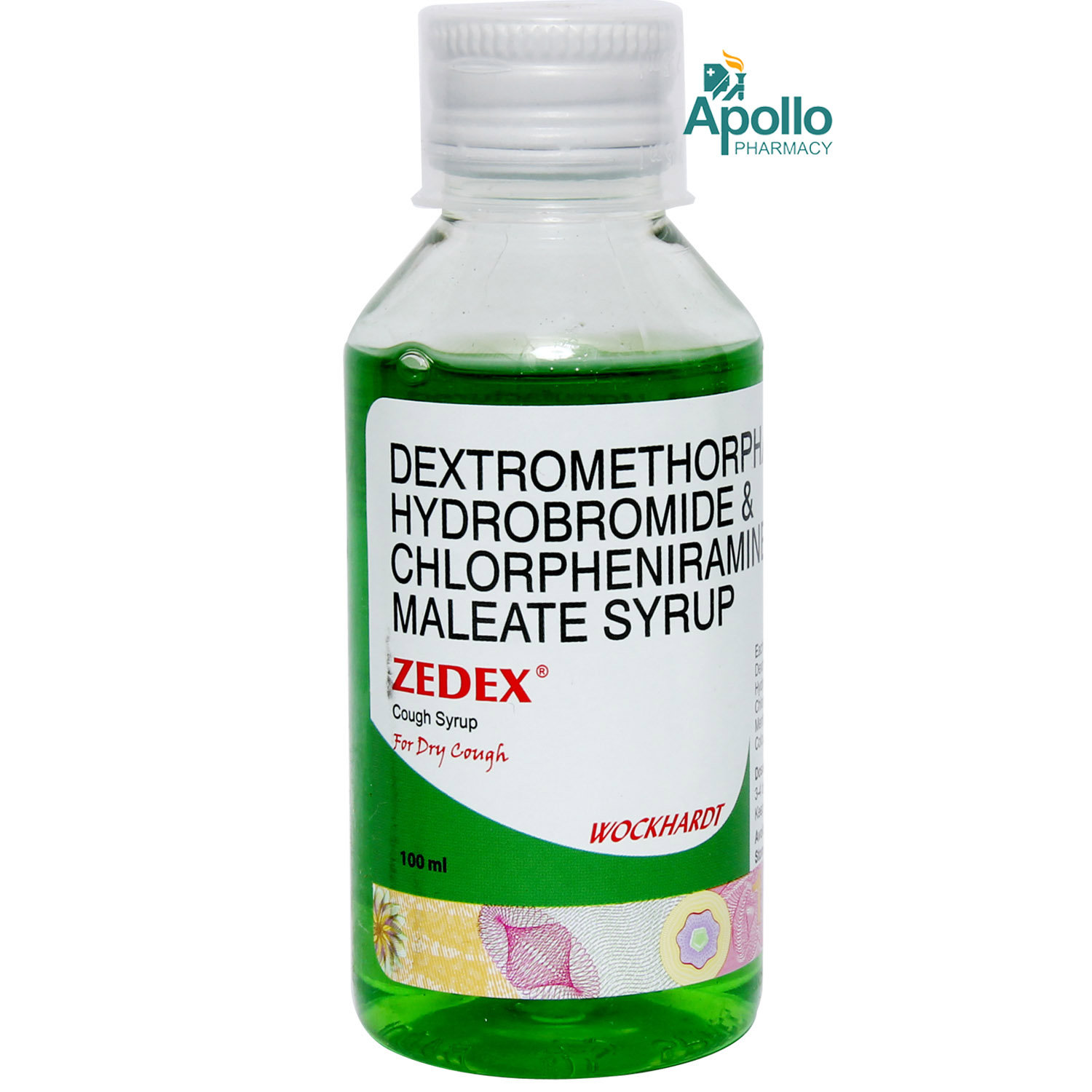Refid Syrup 100 ml
MRP ₹94
(Inclusive of all Taxes)
₹14.1 Cashback (15%)
Provide Delivery Location
Online payment accepted
 Prescription drug
Prescription drugWhats That
Composition :
Consume Type :
Expires on or after :
Return Policy :
About Refid Syrup
Refid Syrup is primarily used to treat dry cough. Coughing (dry or productive) is the body’s way of clearing irritants (like allergens, mucus or smoke) from airways and preventing infection. There are two types of coughs, namely: Dry cough and chesty cough. A dry cough is tickly and doesn't produce any vicious or thick mucus, while a chesty cough (wet cough) means mucous or sputum is produced to help clear the airways.
Refid Syrup is a combination of two drugs, namely: Chlorphenamine maleate (antihistamine) and Dextromethorphan (cough suppressant). Chlorphenamine maleate belongs to the class of antihistamines or anti-allergic that works by blocking the action of histamine, a substance responsible for causing allergic reactions. It helps to provide relief from symptoms of allergy such as sneezing, runny nose, watery eyes, itching, swelling, and congestion or stiffness. On the other hand, Dextromethorphan belongs to the class of cough suppressants that works by blocking the transmission of nerve signals from the cough centre in the brain to the muscles that produce cough. Together, Refid Syrup helps relieve cough, cold and allergic symptoms.
Take Refid Syrup with or without food as advised by your doctor with the help of a measuring cup. Your doctor will recommend how often you take Refid Syrup based on your medical condition. Some people may experience dry mouth, throat, or nose, drowsiness, blurred vision, constipation, dizziness, restlessness or excitation. Most of these side effects of Refid Syrup do not require medical attention and gradually resolve over time. However, if the side effects persist or worsen, please consult your doctor.
If you are allergic to Refid Syrup or any other medicines, please tell your doctor. If you are pregnant or breastfeeding, it is advised to inform your doctor before using Refid Syrup . Refid Syrup is not recommended for children below 2 years of age. If you have glaucoma, urinary problems, enlarged prostate, phenylketonuria (a congenital disability that causes accumulation of amino acid, phenylalanine in the body), cough with mucus or cough caused by asthma, chronic bronchitis or emphysema (a lung condition causing shortness of breath), inform your doctor before taking Refid Syrup .
Uses of Refid Syrup
Directions for Use
Key Benefits
Refid Syrup is a combination of two drugs: Chlorphenamine maleate (antihistamine) and Dextromethorphan (cough suppressant). Chlorphenamine maleate belongs to the class of antihistamines or anti-allergic that works by blocking the action of histamine, a substance responsible for causing allergic reactions. It helps provide relief from allergy symptoms such as sneezing, running nose, watery eyes, itching, swelling, and congestion or stiffness. On the other hand, Dextromethorphan belongs to the class of cough suppressants that block the transmission of nerve signals from the cough centre in the brain to the muscles that produce cough. Thus, together Refid Syrup helps relieve cough, cold and allergic symptoms.
Storage
- Inform your doctor about the nausea and discuss possible alternatives to the medication or adjustments to the dosage.
- Divide your daily food intake into smaller, more frequent meals to reduce nausea.
- Opt for bland, easily digestible foods like crackers, toast, plain rice, bananas, and applesauce.
- Avoid certain foods that can trigger nausea, such as fatty, greasy, spicy, and smelly foods.
- Drink plenty of fluids, such as water, clear broth, or electrolyte-rich beverages like coconut water or sports drinks.
- Use ginger (tea, ale, or candies) to help relieve nausea.
- Get adequate rest and also avoid strenuous activities that can worsen nausea.
- Talk to your doctor about taking anti-nausea medication if your nausea is severe.
- Record when your nausea occurs, what triggers it, and what provides relief to help you identify patterns and manage your symptoms more effectively.
- Preventing Vomiting (Before it Happens)
- Take medication exactly as prescribed by your doctor. This can help minimize side effects, including vomiting.
- Having a small meal before taking your medication can help reduce nausea and vomiting.
- Talk to your doctor about taking anti-nausea medication along with your prescribed medication.
- Managing Vomiting (If it Happens)
- Try taking ginger in the form of tea, ale, or candy to help alleviate nausea and vomiting.
- What to Do if Vomiting Persists
- Consult your doctor if vomiting continues or worsens, consult the doctor for guidance on adjusting your medication or additional treatment.
- Inform your doctor about your constipation symptoms. They may adjust your medication or advise alternative treatments.
- Stay hydrated by drinking sufficient of water (at least 8-10 glasses a day) to help soften stool and promote bowel movements.
- Increase fibre intake by eating foods high in fibre, such as fruits, whole grains, vegetables and legumes, to help bulk up the stool.
- Establish a bowel routine by trying to go to the bathroom at the same time each day to train your bowels.
- Engaging in regular exercise, like walking or yoga, can support in bowel movement stimulation.
- Consult your doctor if constipation persists, and discuss alternative treatments or adjustments to your medication.
- Get enough sleep. Maintain a regular sleep cycle.
- Eat a healthy diet and exercise regularly.
- Manage stress with yoga or meditation.
- Limit alcohol and caffeine.
- Avoid driving or operating machinery unless you are alert.
- Inform your doctor about dizziness symptoms. They may adjust your medication regimen or prescribe additional medications to manage symptoms.
- Follow your doctor's instructions for taking medication, and take it at the same time every day to minimize dizziness.
- When standing up, do so slowly and carefully to avoid sudden dizziness.
- Avoid making sudden movements, such as turning or bending quickly, which can exacerbate dizziness.
- Drink plenty of water throughout the day to stay hydrated and help alleviate dizziness symptoms.
- If you're feeling dizzy, sit or lie down and rest until the dizziness passes.
- Track when dizziness occurs and any factors that may trigger it, and share this information with your doctor to help manage symptoms.
- Avoid driving or operating machinery or activities that require high focus until you know how the medication affects you.
- Maintain a fixed sleeping schedule, create a relaxing bedtime routine and ensure your sleeping space is comfortable to maximize your sleep quality.
- Limit alcohol and caffeine as these may worsen drowsiness and disturb sleep patterns.
- Drink plenty of water as it helps with alertness and keeps you hydrated and for overall well-being.
- Moderate physical activity can improve energy levels, but avoid intense workouts right before bedtime.
- Confusion is a major psychotic disorder that needs immediate medical attention.
- Acknowledge your experience and put effort to control confusion.
- Avoid smoking and alcohol intake as it can worsen the condition and increase your confusion.
- Practice meditation and yoga to avoid anxiety, which can be one of the leading causes.
- Talk to your dietician and consume food that can improve your mental health.
Drug Warnings
Avoid using Refid Syrup if you have taken medicines, such as linezolid, phenelzine, selegiline, rasagiline, isocarboxazid, tranylcypromine, and methylene blue injection in the past 14 days. Persons who have a history of drug abuse should use Refid Syrup with caution as it may cause unwanted side effects. It is advised to seek medical help if the cough does not go away or if it is followed by a high fever, skin rash, or persistent headache. Refid Syrup may cause drowsiness, dizziness, blurred vision in some patients, therefore drive only if you are alert. Refid Syrup should not be used in elderly patients with confusion. Refid Syrup contains sorbitol so it should be avoided in patients with problems of fructose intolerance.
Drug-Drug Interactions
Drug-Drug Interactions
Login/Sign Up
Co-administration of Refid Syrup 100 ml and Selegiline may increase the risk of serotonin syndrome (a condition in which a chemical called serotonin builds up in your body).
How to manage the interaction:
Co-administration of Selegiline with Refid Syrup 100 ml can possibly result in an interaction, but it can be taken if a doctor has advised it. If you notice any of these symptoms - confusion, hallucination, fits, increased heart rate, fever, excessive sweating, shivering, shaking, blurred vision, muscle spasm, stiffness, incoordination, stomach cramps, nausea, vomiting, or diarrhea - make sure to contact a doctor right away. Do not stop using any medications without talking to a doctor.
Taking Tranylcypromine with Refid Syrup 100 ml can increase the risk of serotonin syndrome (a condition in which a chemical called serotonin increases in your body).
How to manage the interaction:
Taking Refid Syrup 100 ml with Tranylcypromine is not recommended, but can be taken together if prescribed by a doctor. However, consult a doctor if you experience confusion, hallucination(seeing and hearing things that do not exist), fit blood pressure alteration, increased heart rate, fever, excessive sweating, shivering or shaking, blurred vision, pain in the muscles or stiffness, incoordination, stomach cramps, nausea, vomiting, and diarrhea. Do not discontinue any medications without consulting a doctor.
Co-administration of Phenelzine and Refid Syrup 100 ml can increase the risk of serotonin syndrome (A condition in which a chemical called serotonin builds up in your body).
How to manage the interaction:
Co-administration of Phenelzine and Refid Syrup 100 ml can lead to an interaction. However, if you experience any symptoms like confusion, hallucination, seizure, changes in blood pressure, increased heart rate, fever, excessive sweating, shivering or shaking, blurred vision, muscle stiffness, tremors, stomach cramps, nausea, vomiting, and diarrhea, consult a doctor immediately. Do not stop using any medications without a doctor's advice.
Co-administration of Isocarboxazid with Refid Syrup 100 ml can increase the risk of serotonin syndrome (A condition in which a chemical called serotonin builds up in your body).
How to manage the interaction:
Taking Refid Syrup 100 ml and Isocarboxazid can lead to an interaction. However, if you experience any symptoms like confusion, hallucination, seizure, changes in blood pressure, increased heart rate, fever, excessive sweating, shivering or shaking, blurred vision, muscle stiffness, tremors, stomach cramps, nausea, vomiting, and diarrhea, consult a doctor immediately. Do not stop using any medications without a doctor's advice.
Co-administration of Pargyline and Refid Syrup 100 ml can increase the risk of serotonin syndrome (A condition in which a chemical called serotonin builds up in your body).
How to manage the interaction:
Co-administration of Refid Syrup 100 ml and Pargyline can lead to an interaction. However, if you experience any symptoms like confusion, hallucination, seizure, changes in blood pressure, increased heart rate, fever, excessive sweating, shivering or shaking, blurred vision, muscle stiffness, tremors, stomach cramps, nausea, vomiting, and diarrhea, consult a doctor immediately. Do not stop using any medications without a doctor's advice.
Co-administration of Refid Syrup 100 ml and Procarbazine may increase the risk of serotonin syndrome (a condition in which a chemical called serotonin builds up in your body).
How to manage the interaction:
Co-administration of Procarbazine with Refid Syrup 100 ml can possibly result in an interaction, but it can be taken if a doctor has advised it. If you notice any of these symptoms - confusion, hallucination, seizure, increased heart rate, fever, excessive sweating, shivering, shaking, blurred vision, muscle spasm, stiffness, incoordination, stomach cramps, nausea, vomiting, or diarrhea - make sure to contact a doctor right away. Do not stop using any medications without talking to a doctor.
Taking Rasagiline with Refid Syrup 100 ml can increase the risk of serotonin syndrome (A condition in which a chemical called serotonin increase in your body).
How to manage the interaction:
Taking Refid Syrup 100 ml with Rasagiline is not recommended as it can possibly result in an interaction, it can be taken if a doctor has advised it. If you notice any of these symptoms like confusion, hallucination, fits, extreme changes in blood pressure, increased heart rate, fever, excessive sweating, shivering or shaking, blurred vision, muscle spasm or stiffness, shaking, incoordination, stomach cramps, nausea, vomiting, and diarrhea, consult a doctor. Do not discontinue any medications without consulting a doctor.
Taking Refid Syrup 100 ml and Potassium citrate (in tablet or capsule form) together can increase the risk of stomach ulcers, bleeding, and gastrointestinal injury.
How to manage the interaction:
Taking Refid Syrup 100 ml with Potassium citrate is not recommended as it can lead to an interaction, it can be taken if prescribed by the doctor. However, if you experience any symptoms such as severe stomach pain, bloating, lightheadedness or dizziness, nausea, vomiting (especially with blood), decreased hunger, or dark, tarry stools, consult the doctor immediately. Do not discontinue any medications without a doctor's advice.
Taking Refid Syrup 100 ml and Potassium chloride (in tablet or capsule form) together can increase the risk of stomach ulcers, bleeding, and gastrointestinal injury.
How to manage the interaction:
Taking Refid Syrup 100 ml with Potassium chloride it not recommended as it can lead to an interaction, it can be taken if your doctor has prescribed it. However, if you experience any symptoms such as severe stomach pain, bloating, lightheadedness or dizziness, nausea, vomiting (especially with blood), decreased hunger, or dark, tarry stools, consult the doctor. Do not discontinue any medications without a doctor's advice.
Co-administration of Refid Syrup 100 ml and Desvenlafaxine might raise serotonin hormone levels in the body and may affect the brain or nerve cells. Increased serotonin hormone can lead to severe side effects.
How to manage the interaction:
Although there is a possible interaction between Refid Syrup 100 ml and Desvenlafaxine, you can take these medicines together if prescribed by a doctor. However, if you experience symptoms such as seizure (fits), confusion, hallucination, increased heart rate, fever, excessive sweating, shivering or shaking, tremors, incoordination, blurred vision, muscle spasms or stiffness, nausea, vomiting, stomach cramps, and diarrhea, contact a doctor immediately. Do not discontinue the medications without consulting a doctor.
Drug-Food Interactions
Drug-Food Interactions
Login/Sign Up
Diet & Lifestyle Advise
- Avoid dairy products such as milk as they may increase mucus production.
- Also, avoid processed or refined foods. Instead, replace baked foods, fried foods, white bread, white pasta, french fries, sugary desserts, and chips with green leafy vegetables.
- Drink plenty of fluids to avoid dry throat while you have a cough. It also helps loosen mucus.
- Avoid citrus fruits as they may worsen the cough.
- Eat fruits rich in water content such as pears, watermelon, peaches, and pineapples.
Side Effects of Refid Syrup
- Dry mouth, throat or nose
- Drowsiness
- Blurred vision
- Constipation
- Dizziness
- Restlessness or excitation
Habit Forming
Therapeutic Class
All Substitutes & Brand Comparisons
RX
Out of StockCodzi-D Syrup 100 ml
FDC Ltd
₹54
(₹0.49/ 1ml)
42% CHEAPERRX
Out of StockBroxum D NF Syrup 100 ml
Eris Life Sciences Ltd
₹70
(₹0.63/ 1ml)
25% CHEAPERRX
Out of StockJoscof-D Syrup 100 ml
Joslin Pharmaa India Pvt Ltd
₹78
(₹0.7/ 1ml)
17% CHEAPER
Author Details
We provide you with authentic, trustworthy and relevant information
Drug-Diseases Interactions
Drug-Diseases Interactions
Login/Sign Up
FAQs
Drug-Drug Interactions Checker List
- DIPHENHYDRAMINE
- DESVENLAFAXINE
- ESCITALOPRAM
- VILAZODONE
Special Advise
- Contact a doctor if your symptoms do not improve even after taking Refid Syrup for 7 days.
- Contact a doctor immediately if you develop fever, rash, or headaches after taking Refid Syrup .
- If you are about to undergo any medical tests or surgery, please inform your doctor that you are taking Refid Syrup .
Disease/Condition Glossary
Cough: Coughing is the body’s way of clearing irritants (like allergens, mucus, or smoke) from airways and preventing infection. Coughs may be dry or productive. A productive cough (wet cough) brings up sputum (phlegm, mucus, and other matter) from the lungs. Cough is commonly caused as a response to allergy or viral infection but coughing up mucus is possibly an indication of infection in the respiratory tract. If you are coughing thick, solid white mucus, it indicates you may have a bacterial infection in the airways. If the mucus is clear or light-coloured, it indicates you may have allergies or a minor infection in the respiratory tract, and yellow or green mucus indicates a respiratory infection.

Have a query?
Alcohol
Safe if prescribed
Refid Syrup may increase the effects of alcohol so it is advised to avoid alcohol consumption.
Pregnancy
Consult your doctor
The safety of Refid Syrup in pregnant women is unknown. Therefore, it is given to pregnant women only if the doctor thinks the benefits outweigh the risks.
Breast Feeding
Consult your doctor
Refid Syrup should not be given to breastfeeding mothers unless the benefit to the mother outweighs the potential harm to the newborn.
Driving
Safe if prescribed
Refid Syrup may impair thinking or cause blurred vision in some people. Therefore, drive only if you are alert after taking Refid Syrup .
Liver
Consult your doctor
Take Refid Syrup with caution, especially if you have a history of liver disease. The dose may be adjusted by your doctor as required.
Kidney
Consult your doctor
Take Refid Syrup with caution, especially if you have a history of kidney disease. The dose may be adjusted by your doctor as required.
Children
Safe if prescribed
Refid Syrup is not recommended for children below 2 years of age. However, it can be used by children who are more than 2 years of age if prescribed by a child specialist.















_0.jpg?tr=q-85)
